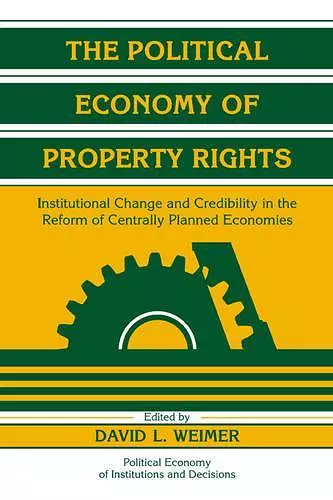The Political Economy of Property Rights
Institutional Change and Credibility in the Reform of Centrally Planned Economies
Format:Hardback
Publisher:Cambridge University Press
Published:13th Apr '97
Currently unavailable, and unfortunately no date known when it will be back
This hardback is available in another edition too:
- Paperback£36.99(9780521180702)

A 1997 investigation of the transformation of property rights in post-communist countries and China.
Originally published in 1997, The Political Economy of Property Rights investigates the transformation of property rights in post-communist countries and China. The movement to effective market economies requires the creation of effective supporting institutions. This process is inherently political, and thus should be studied from the perspective of political economy.Originally published in 1997, The Political Economy of Property Rights reports on comparative research into the transformation of property rights in post-communist countries and China. Two important theoretical questions unify the contributions: what aspects of political systems give credibility to systems of property rights? What can be learned from the transformation of property rights in post-communist countries about the large-scale change of economic institutions? The contributors consider the credibility of property rights as arising from the strategic interaction of political and economic actors, and they apply this perspective and test its implications using a variety of qualitative and quantitative methods. Overall, the volume demonstrates the value of coordinated cross-national research by area specialists sharing a common focus on questions of political economy.
"...recommended to anyone dealing with privatization strategies in the transformation economies or with the political economy of institutional change." Thomas Wagner, Journal of Institutional & Theoretical Economics
"...nothing could be more than a book on the interaction between the political insitutions of democracy and economic transformation. IThe Political Economy of Property Rights was the result of comparative studies made by the respective country specialists." Slavic Reviews
"This volume examines why the countries have followed the policy courses that they did. Weimer describes the basic principles of property rights, in particular, security against appropriation by others, emphasizes the close connection between private property and democracy, and then summarizes the other contributions. ...a major step toward developing such a full model, as it confronts the modesl with many empirical cases. We can then see what data and techiniques are most successful in testin the theory." Kenneth Koford, Journal of Comparative Economics
ISBN: 9780521581011
Dimensions: 235mm x 158mm x 26mm
Weight: 746g
384 pages